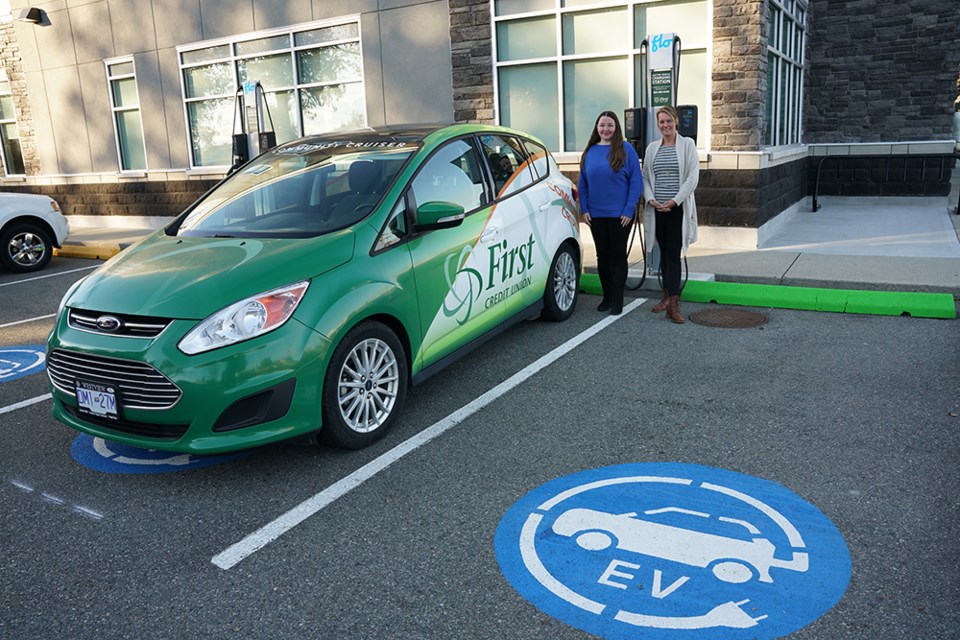First Credit Union (FCU) is taking responsibility for reductions in waste and greenhouse gases (GHG) and sharing its knowledge with the broader community in hopes for greater impact.
Caitlin Bryant, FCU social impact manager, said the credit union has worked with experts such as Let’s Talk Trash and Zero Waste Canada, plus consultants for the past few years to become more environmentally aware and responsible.
“In response to requests from members, First Credit Union started our official environmental responsibility journey back in 2017/2018 with the creation of an employee sustainability committee, the Green Team, and collaboration with local experts to collect a wide range of data including energy and paper usage, waste management, and even employee commuting,” said Bryant. “Once we had gathered some data, we were able to get a baseline measurement of our overall GHG emissions. As the adage goes, you can’t manage what you don’t measure.
“We’re very fortunate to have sustainability experts like the Let’s Talk Trash Team right here in qathet. After looking at the data collected during waste composition audits they conducted, we knew we had more to learn about waste management and diversion, so we partnered with Zero Waste Canada to offer free access to the Zero Waste Fundamentals certificate for First Credit Union employees, members and any interested individuals or businesses in the communities we serve.”
Bryant said there is a need to build awareness and skills around environmental sustainability, but especially in the business sector, because it plays a huge role in collective emissions.
“That’s why we adopted a triple bottom line framework in 2021; it means we are no longer measuring our success by financial growth alone, but by our contributions to people, planet and prosperity in the communities we serve,” added Bryant.
She said the recent renovation of FCU’s Powell River branch has provided a great opportunity to upgrade to more sustainable practices and infrastructure. The branch now has four electric vehicle charging stations, bike racks, motion sensing lighting, superior insulation, waste sorting stations including composting, and to help reduce the emission created by employee commuting, the credit union now offers office e-bikes for running errands or commuting. She said there is an imperative to continue to make substantial reductions in the coming years.
Sustainable practices
“Though some aspects were planned far in advance, we were able to incorporate a lot of what we were learning about sustainable practices during the renovation,” said Bryant. “For example, during the demolition, we saved everything reusable. We kept it aside and we did outreach to local nonprofits and businesses so we could divert as many of those building materials from the landfill as possible.
“A great example is a local day care that was doing renovations at the time. They were able to use interior windows and took all the old solid wood doors and made table tops out of them.”
Another example is putting in hand dryers and composting brown paper hand towels instead of throwing them out.
“We have done a lot of different things,” said Bryant. “There are a lot of easy wins once you start looking at all the inputs and outputs.
“Overall, the philosophy is: this is a journey, and we are not experts. We are learning. We’re a cooperative and our purpose is to empower through knowledge, so naturally we take every opportunity to share what we’re learning with our members and the communities we serve.”
Bryant said that since FCU started conducting GHG emissions reports (biannually), it has seen a 27 per cent reduction in overall GHG emissions, including a 15 per cent reduction in employee commuting and 57 per cent reduction in paper use, to name a few. The credit union also became B-Corp Certified in 2022, which is a designation that comes with a rigorous screening process and re-certification every three years.
Bryant said if businesses haven’t started down the path of making reductions, it can be scary, because there is so much to know.
“We are approached often by other credit unions and businesses who want to get serious about their impact on the environment,” added Bryant. “People can get stalled at the start line because it can feel overwhelming, but once you get into it, there’s a path, there’s lots of support, and there’s a lot of easy wins to keep you going.
“We are part of the environment, not separate from it, and the issues of environmental responsibility and reduction of harmful emissions are not going anywhere, so the sooner you get started, the further ahead you will be.”




